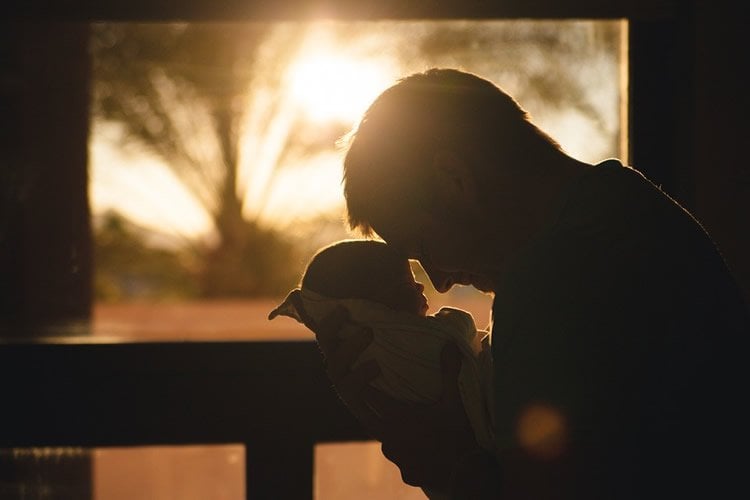Summary: A new study reports teenage daughters of fathers who suffered postnatal depression following their birth are at an increased risk of developing depression.
Source: University of Cambridge.
Fathers as well as mothers can experience post-natal depression—and it is linked to emotional problems for their teenage daughters, new research has found.
Almost one in 20 new fathers suffered depression in the weeks after their child was born, according to a study published in the journal JAMA Psychiatry and co-authored by Professor Paul Ramchandani of the Faculty of Education, University of Cambridge.
The research, based on a sample of more than 3,000 families in Bristol, UK, also identified a link between post-natal depression in men and depression in their daughters as they reached adulthood.
At 18, girls whose fathers had experienced depression after their birth were themselves at greater risk of the condition, researchers found. The “small but significant” increased risk applied only to daughters; sons were not affected.
One reason for this “handing on” effect could be that post-natal depression in fathers is sometimes linked with an increased level of maternal depression, researchers concluded. This might mean that family life is more disrupted for everyone with higher levels of stress for all. It may also be that the having one or both parents with depression affects the way in which parents interact with their children.
It is unclear why girls may be more affected at this age. There may be links to specific aspects of father-daughter relationships as girls go through adolescence, the research team suggests.
The findings are important because they have implications for perinatal services, which have traditionally considered post-natal depression to be a potential problem for mothers only, the study’s authors say. They highlight the importance of recognising and treating depression in fathers during the postnatal period, and call on health professionals to consider both parents when one reports depression.
Professor Ramchandani said: “Research from this study of families in Bristol has already shown that fathers can experience depression in the postnatal period as well as mothers. What is new in this paper is that we were able to follow up the young people from birth through to the age of 18, when they were interviewed about their own experience of depression. Those young people whose fathers had been depressed back when they were born had an increased risk of depression at age 18 years.
“We were also able to look at some of the ways in which depression in fathers might have affected children. It appears that depression in fathers is linked with an increased level of stress in the whole family, and that this might be one way in which offspring may be affected.
“Whilst many children will not be affected by parental depression in this way, the findings of this study highlight the importance of providing appropriate help to fathers, as well as mothers, who may experience depression.”
Paternal depression campaigner Mark Williams, who set up the lobby group Fathers Reaching Out and campaigns for mental health screening for new fathers as well as mothers, said: “Fathers’ Postnatal Depression impacts on the whole family when unsupported, often resulting in fathers using negative coping skills, avoiding situations and often feeling anger.

“In my experience of working with families, it’s sometimes only the father who is suffering in silence but sadly very few are asked about their mental health after becoming a parent.”
Earlier research by the same academic team found post-natal depression in fathers was linked to behavioural and emotional problems in their children at three and a half and seven. The effect seems to happen because paternal depression may negatively affect the way a family functions—causing conflict between partners and prompting maternal depression.
The new paper, Association of Maternal and Paternal Depression in the Postnatal Period with Offspring Depression at Age 18 Years, was based on the experiences of 3,176 father and child pairs drawn from the Avon Longitudinal Study of Parents and Children—an ongoing cohort study launched in 1991.
Source: University of Cambridge
Publisher: Organized by NeuroscienceNews.com.
Image Source: NeuroscienceNews.com image is in the public domain.
Original Research: Abstract for “Association of Maternal and Paternal Depression in the Postnatal Period With Offspring Depression at Age 18 Years” by Leticia Gutierrez-Galve, PhD; Alan Stein, FRCPsych; Lucy Hanington, BMBCh; Jon Heron, PhD; Glyn Lewis, PhD; Christine O’Farrelly, PhD; and Paul G. Ramchandani, DPhil in JAMA Psychiatry. Published December 26 2018.
doi:10.1001/jamapsychiatry.2018.3667
[cbtabs][cbtab title=”MLA”]University of Cambridge”Postnatal Depression in Dads Linked to Depression in Teen Daughters.” NeuroscienceNews. NeuroscienceNews, 27 December 2018.
<https://neurosciencenews.com/dad-daughter-depression-10392/>.[/cbtab][cbtab title=”APA”]University of Cambridge(2018, December 27). Postnatal Depression in Dads Linked to Depression in Teen Daughters. NeuroscienceNews. Retrieved December 27, 2018 from https://neurosciencenews.com/dad-daughter-depression-10392/[/cbtab][cbtab title=”Chicago”]University of Cambridge”Postnatal Depression in Dads Linked to Depression in Teen Daughters.” https://neurosciencenews.com/dad-daughter-depression-10392/ (accessed December 27, 2018).[/cbtab][/cbtabs]
Abstract
Association of Maternal and Paternal Depression in the Postnatal Period With Offspring Depression at Age 18 Years
Importance
Paternal depression during the postnatal period has been associated with adverse child outcomes. Family environment has been reported as a pathway for risk transmission from fathers to children. The influence of paternal depression during the postnatal period on offspring depression remains to be clarified.
Objective
To investigate the association between paternal depression in the postnatal period and offspring depression and explore potential mediating and moderating factors that influence any association between paternal and offspring depression.
Design, Setting, and Participants
This prospective study of a UK community-based birth cohort (the Avon Longitudinal Study of Parents and Children) of parents and their adolescent offspring investigated associations between paternal depression during the postnatal period and offspring depression at age 18 years. We tested a hypothesized moderator (ie, sex) and conducted path analysis to examine hypothesized mediators (ie, depression in the other parent, couple conflict, and paternal involvement and emotional problems, conduct problems, and hyperactivity in offspring at age 3.5 years) of the associations between both paternal and maternal depression and offspring depression. Data collection for the Avon Longitudinal Study of Parents and Children began in 1991 and is ongoing. Data analysis for this study was conducted from June 2015 to September 2018.
Exposures
Depression symptoms in fathers at 8 weeks after the birth of their children.
Main Outcomes and Measures
Offspring depression symptoms at age 18 years, using International Statistical Classification of Diseases and Related Health Problems, Tenth Revision codes.
Results
A total of 3176 father-offspring pairs were analyzed; of the children, 1764 were girls (55.5%) and 1412 (44.5%) were boys. Paternal mean (SD) age at delivery was 29.6 (9.6) years. The offspring of fathers who had depression during the postnatal period were at increased risk of experiencing depression symptoms at age 18 years (β = 0.053 [95% CI, 0.02-0.09]). The association is mediated by maternal depression at 8 months after birth (β = 0.011 [95% CI, 0.0008-0.02]; 21% [0.011/0.053]) and conduct problems at 42 months after birth (β = 0.004; [95% CI , −0.00004 to 0.009]; 7.5% [0.004/0.053]). Couple conflict and paternal involvement do not mediate this association. The increased risk is seen in girls but not boys (interaction β = 0.095; P = .01).
Conclusions and Relevance
The association between paternal depression in the postnatal period and depression in girls at age 18 years is partially explained by maternal depression. Couple conflict and paternal involvement were not found to play a role in the risk of transmission; this contrasts with the role that couple conflict was found to play in the risk of childhood behavior problems. Conduct problems in childhood appear to be a pathway for risk transmission between paternal depression and subsequent depression in offspring at age 18 years.






